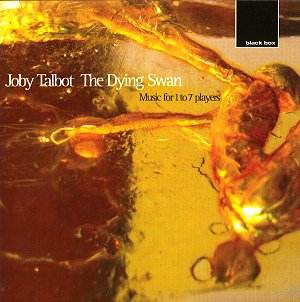I first encountered Joby Talbot, albeit without knowing
it at the time, when switching on the television late one evening I
happened to catch a live performance by Neil Hannon and his "pop"
group, The Divine Comedy. I can recall being fascinated by their
ambitious instrumental arrangements and memorably melodic yet often
adventurous song writing - a kind of "prog-rock" group for
the 1990s. I immediately rushed out and bought the album they had been
promoting in the television show, fin de siècle, a disc
that has remained a firm favourite ever since. Only later, when I came
to know Talbot’s name through classical circles did I realise that his
writing and arrangements were an integral part of The Divine Comedy
sound.
Talbot first collaborated with Neil Hannon in 1993
at around the time he was completing his college studies, a formal and
conventional musical education that had seen him study with Brian Elias,
Simon Bainbridge and Robert Saxton. His credentials were displayed early
and the 1990s, whilst Talbot was still in his twenties, saw works for
the BBC Philharmonic, Britten Sinfonia, Brunel Ensemble and Crouch End
Festival Chorus amongst others. Yet one senses that although these pieces
were written alongside Talbot’s work with The Divine Comedy,
they co-exist entirely naturally, the work of a composer whose integrity
and faithfulness to his own musical instincts is at once apparent.
Stylistically the music on this disc is perhaps somewhere
between Michael Nyman and Philip Glass although Talbot clearly fights
against any overtly dominating influence. Indeed, Talbot and The
Divine Comedy have collaborated with Michael Nyman during the 1997
Flux Festival, a fruitful partnership that won them considerable acclaim.
The two String Quartets of 1998 and 2002 respectively, and in
particular the second, clearly owe something to Glass in their shifting
rhythmic and harmonic patterns although Talbot allows himself a greater
degree of overall license and flexibility whilst still laying the inner
workings of the music bare and clearly open to scrutiny. In contrast,
Blue cell, commissioned by and played here superbly by the Apollo
Saxophone Quartet, is the opposite of what we would conventionally expect
of a work for this ensemble, a study in twilight, hauntingly atmospheric
in its shaded, fluttering textures and delicately hued colours, reflecting
a side of the ensemble not commonly exploited and all the more effective
for it.
That Talbot is not afraid to wear his heart on his
sleeve is a recurring factor in these works and comes to the surface
particularly in the brief but touching solo piano piece, 6/11/98,
the date of Talbot’s wedding to artist Claire Burbridge and "…similarities
between diverse things…" a moving threnody in tribute to Fred
Hutchins Hodder, a twenty year old violinist and mathematician who died
tragically between Christmas and New Year 2001 whilst a student at Pembroke
College, Cambridge.
The Dying Swan stands apart from the other works
on the disc both in terms of its length, a three movement suite extending
to around thirty five minutes, and also in its conception as a score
to accompany the 1916 silent film of the same name by the Russian Yevgeny
Bauer, the music originating as a commission from the British Film Institute.
Talbot weaves music of real beauty here, often with the simplest of
material that he develops with a transparent and logical ingenuity,
yet the underlying pathos and ultimate tragedy of the film is certainly
not lost in the more dramatic moments of the music. Most striking of
all perhaps, the suite commanded my attention for its entire span, an
accolade that certainly cannot be applied to every contemporary score
of this scale I hear these days.
Without exception the performances of all of these
works are exemplary. I have already singled out the Apollo Saxophone
Quartet but the contribution of The Duke Quartet is also of the highest
quality, the recorded sound rich with a resonance (presumably studio
aided) that is, nevertheless, perfect for the textures of these particular
chamber ensembles.
If I had to name a young composer who summed up the
post modernist musical ethic then it would be Joby Talbot. Versatile,
emotionally transparent, thought provoking and above all enjoyable and
accessible without personal or artistic compromise. What emerges is
a musical renaissance man, a genuine voice for the new millennium in
its dawning years.
Christopher Thomas
